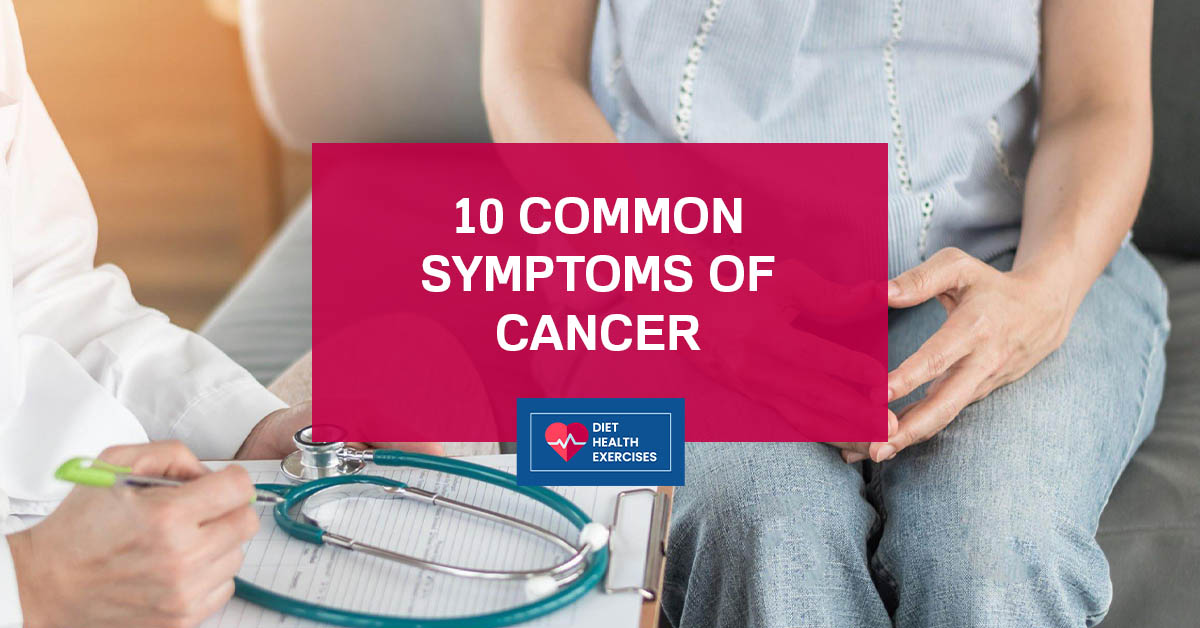Cancer is a disease that affects millions of people worldwide, and early detection is key to successful treatment. Unfortunately, many people don’t know what signs to look out for, which can lead to delayed diagnosis and poorer outcomes. That’s why we’ve put together a list of 10 common symptoms of cancer that you should be aware of. From unexplained weight loss to persistent coughing, these signs can indicate a variety of different types of cancer. By being aware of these symptoms, you can take action if you notice any changes in your body and speak to your doctor about any concerns. So, let’s take a closer look at these warning signs and learn how to spot them early on.
Table of Contents
ToggleUnderstanding the Importance of Early Detection

Cancer is a disease that can be treated successfully if detected early. The earlier cancer is detected, the better the chances of successful treatment. This is why it’s so important to be aware of the common symptoms of cancer and to seek medical attention if you notice any changes in your body. Unfortunately, many people ignore the warning signs and delay seeking medical attention, which can lead to a poorer outcome.
It’s important to remember that not all symptoms necessarily indicate cancer, but it’s always better to err on the side of caution and speak to your doctor if you have any concerns. This is particularly true if you have a family history of cancer or other risk factors, such as smoking or exposure to certain chemicals.
By being proactive about your health and seeking medical attention early, you can increase your chances of successful treatment and long-term survival.
Unexplained Weight Loss
Unexplained weight loss is a common symptom of many different types of cancer, including lung, pancreatic, and stomach cancer. If you lose 10 pounds or more without trying, it’s important to speak to your doctor. Weight loss can occur when cancer cells disrupt the body’s metabolism or when the cancer causes a loss of appetite. Other symptoms that may accompany unexplained weight loss include fatigue, weakness, and changes in bowel habits.
If you notice unexplained weight loss, it’s important to see your doctor as soon as possible. Your doctor may recommend further testing, such as blood tests or imaging scans, to determine the underlying cause of your weight loss. Early detection and treatment can improve your chances of successful treatment and long-term survival.
Persistent Coughing or Hoarseness

Persistent coughing or hoarseness can be a symptom of lung cancer, throat cancer, or thyroid cancer. If you have a cough that lasts for more than three weeks or you develop hoarseness that lasts for more than two weeks, it’s important to speak to your doctor. Other symptoms that may accompany persistent coughing or hoarseness include chest pain, shortness of breath, and coughing up blood.
If you have persistent coughing or hoarseness, your doctor may recommend further testing, such as a chest X-ray or a biopsy. Early detection and treatment can improve your chances of successful treatment and long-term survival.
Changes in Bowel or Bladder Habits
Changes in bowel or bladder habits can be a symptom of colon cancer, bladder cancer, or prostate cancer. If you notice any changes in your bowel or bladder habits, such as blood in your stool or urine, constipation, or diarrhea, it’s important to speak to your doctor. Other symptoms that may accompany changes in bowel or bladder habits include abdominal pain, fatigue, and weight loss.
If you have changes in bowel or bladder habits, your doctor may recommend further testing, such as a colonoscopy or a urine test. Early detection and treatment can improve your chances of successful treatment and long-term survival.
Unexplained Fatigue

Unexplained fatigue is a common symptom of many different types of cancer, including leukemia, colon cancer, and breast cancer. If you feel tired all the time, even after getting plenty of rest, it’s important to speak to your doctor. Other symptoms that may accompany unexplained fatigue include weakness, dizziness, and shortness of breath.
If you have unexplained fatigue, your doctor may recommend further testing, such as blood tests or imaging scans. Early detection and treatment can improve your chances of successful treatment and long-term survival.
Skin Changes or Growths
Skin changes or growths can be a symptom of skin cancer, which is the most common type of cancer in the United States. If you notice any changes in your skin, such as a mole that changes size, shape, or color, it’s important to speak to your doctor. Other symptoms that may accompany skin changes or growths include itching, bleeding, or crusting.
If you have skin changes or growths, your doctor may recommend a biopsy to determine whether the growth is cancerous. Early detection and treatment can improve your chances of successful treatment and long-term survival.
Difficulty Swallowing or Persistent Indigestion

Difficulty swallowing or persistent indigestion can be a symptom of esophageal cancer, stomach cancer, or pancreatic cancer. If you have difficulty swallowing or persistent indigestion, it’s important to speak to your doctor. Other symptoms that may accompany difficulty swallowing or persistent indigestion include weight loss, nausea, and vomiting.
If you have difficulty swallowing or persistent indigestion, your doctor may recommend further testing, such as an endoscopy or a CT scan. Early detection and treatment can improve your chances of successful treatment and long-term survival.
Chronic Pain or Discomfort
Chronic pain or discomfort can be a symptom of many different types of cancer, including bone cancer, ovarian cancer, and prostate cancer. If you have chronic pain or discomfort that lasts for more than a few weeks, it’s important to speak to your doctor. Other symptoms that may accompany chronic pain or discomfort include fatigue, weight loss, and fever.
If you have chronic pain or discomfort, your doctor may recommend further testing, such as imaging scans or a biopsy. Early detection and treatment can improve your chances of successful treatment and long-term survival.
Conclusion and the Importance of Seeking Medical Attention
In conclusion, cancer is a disease that can affect anyone, regardless of age, gender, or lifestyle. By being aware of the common symptoms of cancer and seeking medical attention if you have any concerns, you can increase your chances of successful treatment and long-term survival. Remember, not all symptoms necessarily indicate cancer, but it’s always better to err on the side of caution and speak to your doctor if you have any concerns.
If you notice any of the symptoms discussed in this article, it’s important to seek medical attention as soon as possible. Early detection and treatment can make a significant difference in your chances of successful treatment and long-term survival. Don’t hesitate to speak to your doctor about any concerns you may have, and be proactive about your health. Remember, early detection is key to successful treatment.


